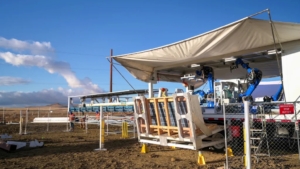Charge Robotics uses mobile factory to assemble solar panels
As a response to the growing demand for solar energy and a persistent labor shortage, Charge Robotics has introduced a solution that harnesses the power of automation to streamline the assembly of solar panels. The company has developed a mobile factory, similar to a shipping container, where robotic arms piece together solar panels.
Once steel piles are securely hammered into the ground, Charge Robotics’ specialized system, named „Sunrise“, takes over. Sunrise expertly screws together the frames that hold the panels.
Despite the automation, a small team remains essential to oversee the operations, including system operators, drivers, and technicians. The steel piles have to be hammered into the ground and the fabricated solar modules have to be distributed and fixated on the steel piles. Nevertheless, this blend of human oversight and robotic precision significantly enhances the productivity of solar panel installations. Impressively, this approach enables the installation of 1 Megawatt of solar capacity per day.
Here is a video from YouTube featuring highlights of Sunrise in action.
Charge Robotics’ collaboration with Solv Energy has demonstrated the efficacy of this robotic system, with Solv Energy lauding the robots for their impressive performance. The strategic partnership aims to amplify solar panel output while optimizing labor efficiency, a crucial step towards meeting the Solar Energy Industries Association’s ambitious goal of reaching nearly 850GW of solar energy by 2030. This target necessitates a sevenfold increase in annual solar deployment compared to 2020 levels.
This technological advancement represents a pivotal shift in how large scale projects are deployed.
Interesting it would be to see if the distribution of material and solar modules would be taken over by autonomous vehicles.

Source: https://www.fastcompany.com/91108331/these-solar-assembling-robotic-arms-could-solve-one-of-the-industrys-biggest-problems

